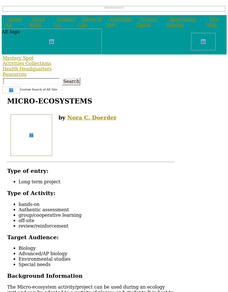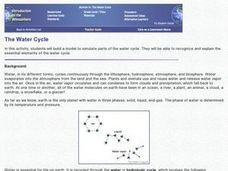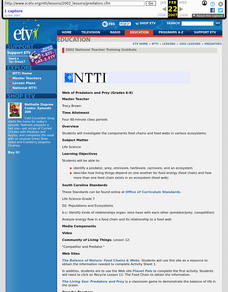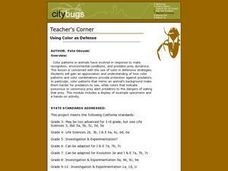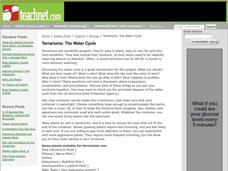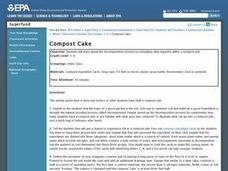Curated OER
Quilt Squared
Students study West Virginia quilts. In this mathematics lesson plan, students use symmetry, geometric shapes, and patterns to create their own quilt square.
Curated OER
Prairie Food Chains & Webs
Students complete a food chain. In this ecosystem lesson, students learn about producers, consumers and decomposers. Students identify herbivores, carnivores and omnivores and complete two worksheets.
Curated OER
Earth Day - Hooray
Learners listen to the story, Earth Day - Hooray!, and discuss the story as it is being read. In this Earth Day lesson, students discuss incentives and penalties in regards to taking care of the Earth. This lesson plan also...
Curated OER
Ecosystems Beneath the Surface
Sixth graders create a KWL chart about microorganisms. In this biology lesson, 6th graders create and label a diagram on a microbial mat. They investigate the processes involved in the carbon, oxygen and sulfur cycles.
Curated OER
Micro-Ecosystems
Students create a sustainable, self-contained ecosystem in a ten-gallon aquarium.
Curated OER
Water Cycle (Grades 2-4)
Students demonstrate their understanding of the water cycle and how it effects the environment by graphically depicting and describing the water cycle.
Curated OER
The Water Cycle--Model Simulation
Students build a model to simulate parts of the water cycle. They recognize and explain the essential elements of the water cycle.
Curated OER
GUITARS AS SCULPTURE
Students discuss guitars, pointing out different parts of the guitar, compare/contrast guitars from different times, imagine they are designers hired to build a new age guitar, create many preliminary sketches, choose one, and begin...
Curated OER
Sew, You Want To Quilt?
Students become familiar with the achievements of the artist Faith Ringgold. They take notice of the patterns in their environment. They connect the mathematical concept of patterns to create a class quilt.
Curated OER
Biodegradability
Students study the effects of water, salt water and heat on common household materials. They separate an emulsion and show that the materials are completely recoverable and observe the effect of acetone and water on polystyrene.
Curated OER
Web of Predators and Prey
Students investigate the components food chains and food webs in various ecosystems. They describe how living things depend on one another for food energy (food chain) and how more than one food chain exists in an ecosystem
Curated OER
SAVE OUR EARTH
Students research current environmental problems in order to develop and deliver an oral presentation. The presentation persuades the audience to act on the student's point of view on the issue.
Curated OER
Native Species Restoration and its Impact on Local Populations
Young scholars explore how predators help control the growth of prey species for a more balanced ecosystem.
Curated OER
Non Native Species: English Ivy-Landscape Plant or Deadly Killer?
High schoolers study the impact that invasive species have on biodiversity and more natural areas.
Curated OER
COMPOSTING: WHY BOTHER?
Learners explore the composting process and participate in a contest to make the most compost the fastest from the school's kitchen and yard waste.
Curated OER
The Six Faces of Garbage
Middle schoolers use the mathematics of surface area to approach the problem of garbage pollution from the classroom. After watching a video, students construct replicas of cereal boxes and compute their surface area.
Curated OER
Using Color as Defense
Students explore mimicry and crypsis, participate in hands-on predator-prey activity, and practice calculating averages and graph results in histogram.
Curated OER
The Water Cycle
Learners create terrariums in containers in order to study the Water Cycle. They examine how the terrarium maintains life in the closed environment.
Curated OER
Hazardous Waste Issues in the News
Students work together to research hazardous waste in the news. They discover how large the hazardous waste issue is. They complete an experiment and discuss how the issues affect their community.
Curated OER
Compost Cake
Young scholars examine the decomposition process. They create their own class compost pile and record their observations. They discover which materials decompose at a different rate.
Curated OER
How Many Birds Would It Take To Keep A Jackal Alive?
Students examine the role of large families in some animal populations. They work together to complete an activity related to food supply. They discover the relationship between preys and predators.
Curated OER
Man's Struggle for Environmental Preservation
Young scholars examine the way all living things are connected to one another. In groups, they participate in experiments in which they analyze the chemical processes through the biosphere and explain the role of energy. They also...
Curated OER
Solid Waste Takes Over
Learners explore solid waste and its effects on the environment. They explain some of the major problems caused by waste disposal and the use of landfills. They suggest ways to reduce the amount of solid waste going into a landfill.
Curated OER
It's all In the Package
Students examine the concept of reducing solid waste and how it relates to product packaging. They read about and evaluate the packaging decisions of two major U.S. corporations, develop a t-chart comparing the pros and cons of various...
Other popular searches
- Trash & Recycling
- Trash Recycling
- Global Warming Recycling
- Recycling Aluminum
- Recycling Activity
- Trash & Recycling Rubric
- Paper Recycling
- Trash & Recycling Test
- Trash & Recycling Plastic
- School Recycling
- Recycling Lessons
- Trash & Recycling Composting






